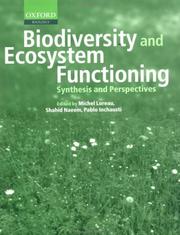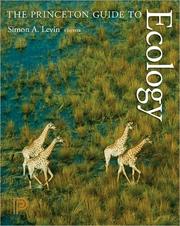| Listing 1 - 10 of 11 | << page >> |
Sort by
|
Book
ISBN: 1282644998 9786612644993 1400834163 9781400834167 9780691122700 0691122709 9780691122694 0691122695 Year: 2010 Publisher: Princeton, NJ
Abstract | Keywords | Export | Availability | Bookmark
 Loading...
Loading...Choose an application
- Reference Manager
- EndNote
- RefWorks (Direct export to RefWorks)
The major subdisciplines of ecology--population ecology, community ecology, ecosystem ecology, and evolutionary ecology--have diverged increasingly in recent decades. What is critically needed today is an integrated, real-world approach to ecology that reflects the interdependency of biodiversity and ecosystem functioning. From Populations to Ecosystems proposes an innovative theoretical synthesis that will enable us to advance our fundamental understanding of ecological systems and help us to respond to today's emerging global ecological crisis. Michel Loreau begins by explaining how the principles of population dynamics and ecosystem functioning can be merged. He then addresses key issues in the study of biodiversity and ecosystems, such as functional complementarity, food webs, stability and complexity, material cycling, and metacommunities. Loreau describes the most recent theoretical advances that link the properties of individual populations to the aggregate properties of communities, and the properties of functional groups or trophic levels to the functioning of whole ecosystems, placing special emphasis on the relationship between biodiversity and ecosystem functioning. Finally, he turns his attention to the controversial issue of the evolution of entire ecosystems and their properties, laying the theoretical foundations for a genuine evolutionary ecosystem ecology. From Populations to Ecosystems points the way to a much-needed synthesis in ecology, one that offers a fuller understanding of ecosystem processes in the natural world.
Population biology. --- Biodiversity. --- Ecology. --- Biology --- Ecology --- Biological diversification --- Biological diversity --- Biotic diversity --- Diversification, Biological --- Diversity, Biological --- Biocomplexity --- Ecological heterogeneity --- Numbers of species --- Balance of nature --- Bionomics --- Ecological processes --- Ecological science --- Ecological sciences --- Environment --- Environmental biology --- Oecology --- Environmental sciences --- Population biology
Book
ISBN: 2706153083 Year: 2022 Publisher: [Place of publication not identified] : Presses universitaires de Grenoble,
Abstract | Keywords | Export | Availability | Bookmark
 Loading...
Loading...Choose an application
- Reference Manager
- EndNote
- RefWorks (Direct export to RefWorks)
Transition environnementale Une série de la collection « Virus de la recherche » Face à l'urgence climatique et aux défis environnementaux, les scientifiques se mobilisent ! Placée sous l'égide du conseil scientifique « Capitale verte et transition », cette nouvelle série d'e-books propose des articles inédits signés par des chercheurs de tous horizons : sciences, sciences de la terre, sciences de l'ingénieur et sciences humaines et sociales. En lien avec les missions du conseil scientifique - qui rassemble près de 40 chercheurs de toutes les disciplines - ces textes courts visent à faire circuler les connaissances sur la question des transitions environnementales et de leurs impacts. Tout au long de l'année 2022, les publications de la série viendront ponctuer la réflexion menée dans le cadre de la labellisation « Capitale verte européenne » attribuée par la Commission européenne au territoire grenoblois. Chaque mois, une nouvelle thématique sera traitée - le climat, l'air, l'énergie, les mobilités, l'alimentation, les villes, etc. Les scientifiques sont des gens passionnés. Leurs textes dévoilent leur savoir et nous éclairent sur les controverses qui nourrissent ces sujets, exposant les ressorts sensibles du métier de chercheur - ses tâtonnements, ses doutes, ses énigmes mais aussi ses espoirs. Bonne lecture à tous !.
Book
Year: 2000 Publisher: S.l. s.n.
Abstract | Keywords | Export | Availability | Bookmark
 Loading...
Loading...Choose an application
- Reference Manager
- EndNote
- RefWorks (Direct export to RefWorks)

ISBN: 0198515715 0198515707 9780198515715 9780198515708 Year: 2002 Publisher: Oxford [etc.] : Oxford University Press,
Abstract | Keywords | Export | Availability | Bookmark
 Loading...
Loading...Choose an application
- Reference Manager
- EndNote
- RefWorks (Direct export to RefWorks)
574.472 --- 574.2 --- 574.2 Organisms and environment. Habitat. Preferendum --- Organisms and environment. Habitat. Preferendum --- 574.472 Biodiversity --- Biodiversity --- Ecosystem health --- Ecosystèmes --- Ecosystèmes --- Ecological health --- Health, Ecological --- Health, Ecosystem --- Ecology --- Biological diversification --- Biological diversity --- Biotic diversity --- Diversification, Biological --- Diversity, Biological --- Biology --- Biocomplexity --- Ecological heterogeneity --- Numbers of species --- General ecology and biosociology --- Biodiversité --- Santé
Book
ISBN: 1119902916 1119902894 1119902908 Year: 2022 Publisher: Hoboken, New Jersey : ISTE Ltd.,
Abstract | Keywords | Export | Availability | Bookmark
 Loading...
Loading...Choose an application
- Reference Manager
- EndNote
- RefWorks (Direct export to RefWorks)
Book
Abstract | Keywords | Export | Availability | Bookmark
 Loading...
Loading...Choose an application
- Reference Manager
- EndNote
- RefWorks (Direct export to RefWorks)
Dissertation
Abstract | Keywords | Export | Availability | Bookmark
 Loading...
Loading...Choose an application
- Reference Manager
- EndNote
- RefWorks (Direct export to RefWorks)
Book

ISBN: 9782930391502 2930391502 Year: 2013 Publisher: Bruxelles : CIVA,
Abstract | Keywords | Export | Availability | Bookmark
 Loading...
Loading...Choose an application
- Reference Manager
- EndNote
- RefWorks (Direct export to RefWorks)
En 1974, Paul Duvigneaud (1913-1991) publiait La Synthèse écologique, un des tout premiers livres d'écologie en langue française. Particulièrement didactique, l'ouvrage a largement contribué à populariser la science écologique dans le monde francophone. Paul Duvigneaud aurait eu 100 ans en 2013. À cette occasion, un panel de vingt-deux auteurs francophones apportent un éclairage multidisciplinaire sur l'évolution de la science écologique et de ses relations avec la société. Des concepts nouveaux ont émergé: biodiversité, services écosystémiques, développement durable... Des outils issus de disciplines connexes (géochimie isotopique, marqueurs moléculaires,...) ont ouvert de nouvelles perspectives. Plus que jamais, une nouvelle synthèse écologique est indispensable pour relever les grands défis auxquels l'humanité est confrontée.
Ecology --- Biotic communities --- Ecologie --- Ecosystèmes --- Congresses --- Congrès --- ECO Ecology --- ecology --- ecosystem ecology --- landscape ecology --- biodiversity --- ecosystems --- sustainable development --- symposium proceedings --- Ecosystèmes --- Congrès --- Écosystèmes. --- Écologie. --- Évaluation écologique (Biologie) --- Développement durable. --- Évaluation écologique (biologie) --- Écologisme. --- Duvigneaud, Paul. --- Développement durable --- Écologie.
Book

ISBN: 0691195323 9780691195322 Year: 2020 Publisher: Princeton, NJ
Abstract | Keywords | Export | Availability | Bookmark
 Loading...
Loading...Choose an application
- Reference Manager
- EndNote
- RefWorks (Direct export to RefWorks)
Leading ecologists discuss some of the most compelling open questions in the field todayUnsolved Problems in Ecology brings together many of the world's leading ecologists to discuss the most fundamental research questions confronting the field today. This diverse and thought-provoking collection of essays spans virtually all of the key subfields of the discipline, from behavioral and evolutionary ecology to population biology, community ecology, ecosystem ecology, disease ecology, and conservation biology. These essays are intended to stoke curiosity, challenge prevailing wisdom, and provoke new ways of thinking about ecology in light of new technologies and unprecedented environmental challenges brought on by climate and land-use change. Authoritative and accessible, Unsolved Problems in Ecology is ideal for graduate students in the early stages of their scientific careers and an essential resource for seasoned ecologists looking for exciting new directions to take their research.Sheds light on modern ecology's most important and compelling open questionsFeatures thought-provoking contributions from more than two dozen world-class ecologistsCovers behavior, evolution, communities, ecosystems, resource management, and moreDiscusses ways to raise the financial and intellectual profile of the disciplineAn invaluable resource for graduate students as well as seasoned ecologists
Ecology. --- Population biology. --- Coexistence of species. --- Ecosystem management. --- Biodiversity conservation. --- Biodiversity --- Biological diversity conservation --- Conservation of biodiversity --- Diversity conservation, Biological --- Gender mainstreaming in biodiversity conservation --- Maintenance of biological diversity --- Preservation of biological diversity --- Conservation of natural resources --- Ecosystem management --- Biotic communities --- Ecosystems management --- Applied ecology --- Environmental management --- Nature conservation --- Biodiversity conservation --- Sympatry (Biology) --- Population biology --- Species --- Biology --- Ecology --- Balance of nature --- Bionomics --- Ecological processes --- Ecological science --- Ecological sciences --- Environment --- Environmental biology --- Oecology --- Environmental sciences --- Conservation --- Management --- auto ecology. --- autoecology. --- conservation. --- ecological communities. --- environmental policy. --- environmentalism. --- food web structure. --- food webs. --- growth regulation. --- high dimensional trait space. --- individual-based data. --- interdependence and mutualism. --- intra-genomic variance. --- mating. --- mutation. --- natural resource management. --- population dynamics of complex life cycles. --- population dynamics. --- population size. --- scaling in ecology. --- soil biodiversity. --- species coexistence. --- species richness distribution. --- variance explicit ecology.


ISBN: 1782682961 1282692135 9786612692130 184972699X 1400833027 0691128391 0691156042 9781400833023 0391128396 9780391128392 9780691156040 9780691128399 9781782682967 9781282692138 6612692138 9781849726993 Year: 2009 Publisher: Princeton, NJ
Abstract | Keywords | Export | Availability | Bookmark
 Loading...
Loading...Choose an application
- Reference Manager
- EndNote
- RefWorks (Direct export to RefWorks)
The Princeton Guide to Ecology is a concise, authoritative one-volume reference to the field's major subjects and key concepts. Edited by eminent ecologist Simon Levin, with contributions from an international team of leading ecologists, the book contains more than ninety clear, accurate, and up-to-date articles on the most important topics within seven major areas: autecology, population ecology, communities and ecosystems, landscapes and the biosphere, conservation biology, ecosystem services, and biosphere management. Complete with more than 200 illustrations (including sixteen pages in color), a glossary of key terms, a chronology of milestones in the field, suggestions for further reading on each topic, and an index, this is an essential volume for undergraduate and graduate students, research ecologists, scientists in related fields, policymakers, and anyone else with a serious interest in ecology. Explains key topics in one concise and authoritative volume Features more than ninety articles written by an international team of leading ecologists Contains more than 200 illustrations, including sixteen pages in color Includes glossary, chronology, suggestions for further reading, and index Covers autecology, population ecology, communities and ecosystems, landscapes and the biosphere, conservation biology, ecosystem services, and biosphere management
Ecology. --- Ecology --- Economic aspects. --- Ecological economics --- Balance of nature --- Biology --- Bionomics --- Ecological processes --- Ecological science --- Ecological sciences --- Environment --- Environmental biology --- Oecology --- Electronic monograph. --- Environmental sciences --- Population biology
| Listing 1 - 10 of 11 | << page >> |
Sort by
|

 Search
Search Feedback
Feedback About UniCat
About UniCat  Help
Help News
News